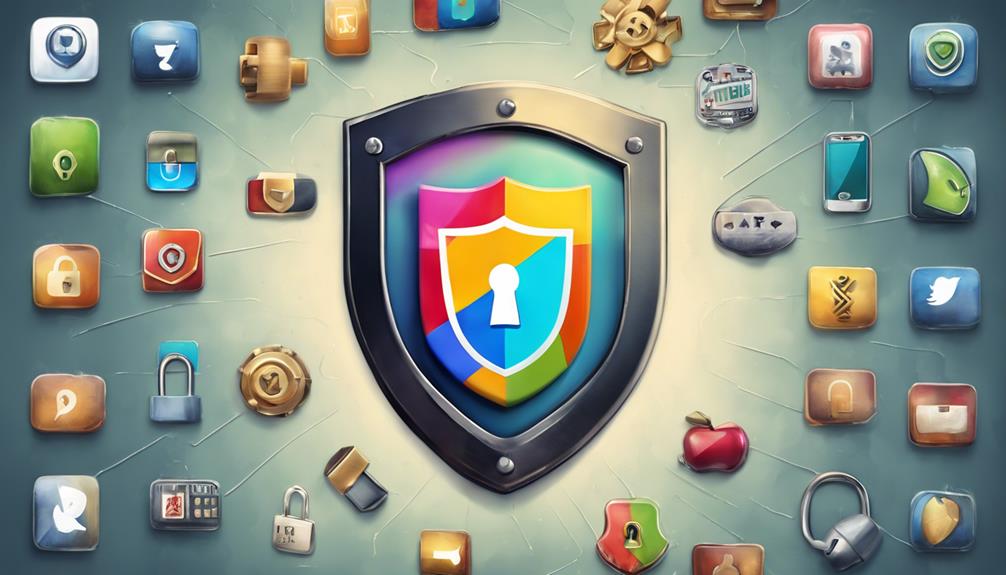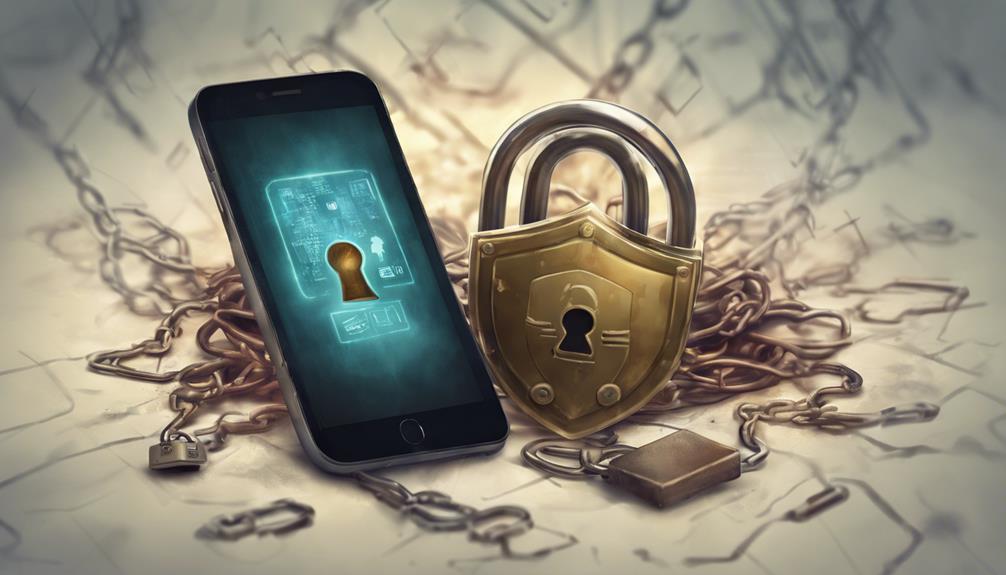Enhance your phone's security by updating software regularly to shield against cyber threats, utilizing official app stores for verified apps, and setting strong passcodes or biometrics for unique identifiers. Mindfully manage app permissions, enable auto-erase after failed attempts, and back up your data to safeguard against hacking. Secure Wi-Fi connections, use VPNs for encrypted browsing, and avoid rooting or jailbreaking actions to maintain phone security. Take control of network access, and with these proactive measures, your phone will be fortified against potential breaches, ensuring a safer digital experience.
Key Takeaways
- Regularly update your phone's software for security patches.
- Use official app stores for verified, secure app downloads.
- Set strong passcodes or use biometrics for access control.
- Be cautious with app permissions, granting only essential access.
- Secure Wi-Fi connections and consider using a VPN for added protection.
Update Software Regularly
Regularly updating your phone's software is essential for maintaining robust security measures against potential cyber threats. Software updates not only bring new features but also include important security patches that shield your device from vulnerabilities.
These security patches are necessary as they address known weaknesses that hackers could exploit to gain unauthorized access to your personal data. Additionally, software updates often come with bug fixes that rectify issues affecting the performance and stability of your phone.
Use Official App Stores

Utilizing official app stores such as Google Play Store and Apple App Store is a critical step in safeguarding your phone against potential security risks posed by malicious or counterfeit applications. These official app stores implement stringent security measures to vet and verify apps before they are made available for download. By adhering to these platforms, users greatly reduce the risk of unwittingly downloading malicious apps that could compromise their device's security.
Official app stores like Google Play Store and Apple App Store continually scan and monitor apps for potential security threats, providing an additional layer of protection. In contrast, using third-party app stores or downloading apps from unknown sources increases the likelihood of inadvertently installing malware or malicious software on your phone.
Opting for official app stores ensures that apps have undergone thorough security checks, thereby decreasing the chances of falling victim to app-based hacking attempts. Stay safe by embracing the security protocols established by these trusted app platforms.
Set Strong Passcodes or Biometrics

When safeguarding your phone from potential hacking threats, setting a strong passcode or utilizing biometric authentication methods are essential steps to enhance security.
A passcode with at least 6 digits provides a basic level of protection, while biometrics like fingerprints or facial recognition offer a more advanced security measure.
Passcode Security Tips
Enhance the security of your phone by setting a strong passcode with at least 6 digits or utilizing biometric authentication methods like fingerprint or facial recognition.
In today's digital age, where phone hacking is a prevalent threat, it is essential to take proactive measures to safeguard your device. Set your phone with a passcode lock that is not easily guessable, avoiding common combinations such as '1234' or '0000.' By incorporating a robust passcode, you can greatly increase the protection of your personal information and prevent unauthorized access.
Biometric authentication, such as fingerprint or facial recognition, offers a secure and convenient alternative to traditional passcodes. These methods provide unique identifiers that enhance the security of your device, ensuring only authorized users can access it.
Stay safe by implementing passcode security measures that act as a barrier against potential breaches, safeguarding your sensitive data from malicious actors. Prioritizing these security tips will strengthen your phone's defenses and reduce the risk of unauthorized access.
Biometric Protection Methods
Biometric protection methods, including strong passcodes and advanced biometric locks, offer an effective means of enhancing smartphone security. By utilizing biometric features like fingerprint or facial recognition, users can establish unique identifiers that significantly enhance the protection of personal information on their devices. Setting a robust passcode to unlock the phone or implementing biometric authentication adds an extra layer of security, making it harder for unauthorized users to gain access to sensitive data. Biometrics not only provide enhanced security but also offer quick and convenient access to the device for the rightful user. Implementing biometric protection methods is crucial in the digital age to safeguard against potential breaches by hackers looking to exploit vulnerabilities in traditional security measures. Strengthening smartphone security through biometric protection methods is a proactive approach to ensure the safety of personal information in an era where unauthorized access poses significant risks.
| Biometric Protection Methods | ||
|---|---|---|
| Advantages | Implementation | Security Enhancement |
| – Unique identifiers | – Fingerprint or facial recognition | – Safeguarding personal information |
| – Extra layer of security | – Quick and convenient access | – Prevention of unauthorized access |
Be Mindful of App Permissions

Carefully evaluating app permissions is vital in safeguarding your phone from potential security risks posed by malicious apps. Granting apps access to sensitive data can make your device vulnerable to exploitation by malicious entities, leading to security breaches.
Particularly on Android devices, where app vetting processes may be less stringent, it is critical to review and restrict app permissions diligently. Before allowing apps to access personal information or device features, it is essential to ponder the implications and necessity of such access.
Regularly monitoring and managing app permissions is crucial to make sure that only essential access is granted for the apps to function properly. By being mindful of app permissions and limiting access to what is strictly required, you can greatly enhance the security of your device and mitigate the risks associated with potentially harmful apps.
Enable Auto-Erase After Failed Attempts

How can you proactively safeguard your sensitive data on your phone in the event of unauthorized access attempts?
One effective method is to enable the auto-erase feature, which acts as a protective measure against potential breaches. This feature, available on most smartphones, automatically wipes your phone's data after a specified number of failed passcode attempts.
By activating auto-erase, you create a barrier that shields your personal and confidential information from falling into the wrong hands, especially in scenarios like theft or hacking incidents.
This security measure serves as a safety net, ensuring that unauthorized access does not compromise your data integrity.
With the auto-erase feature in place, users can have peace of mind knowing that their phone is equipped to respond to multiple incorrect passcode entries by swiftly removing sensitive content, thereby enhancing protection against unauthorized entry to safeguard your valuable information.
Track and Lock Your Phone

Utilize find my device services offered by Apple or Google to remotely track and lock your phone in case of theft or security concerns. These services provide essential features to locate your phone, guaranteeing data safety by allowing you to ring your phone if misplaced. By being proactive and utilizing the track and lock functions, you can be prepared for potential security breaches, safeguarding personal information, and preventing unauthorized access to your data.
In the event of theft or security concerns, the ability to remotely lock your phone through find my phone services can facilitate quick action. This proactive approach not only enhances the security of your device but also offers peace of mind knowing that you have measures in place to protect your data.
Stay vigilant and make the most of these remote tracking and locking features to make sure that your phone remains secure in various scenarios.
Avoid Open WiFi Networks

Open WiFi networks pose a significant security threat to mobile devices. They can be easily monitored by malicious actors. To mitigate this risk, it is essential to utilize VPN services. VPNs encrypt connections and shield against potential data interception on insecure networks.
Additionally, disabling the auto-connect feature on your device can help prevent unintentional connections to unsecure WiFi networks. This step ultimately safeguards your personal information from potential breaches.
Secure Wi-Fi Connections
Enhancing your cybersecurity measures includes steering clear of open public Wi-Fi networks to safeguard your personal data from potential hacking threats.
Public Wi-Fi networks, lacking encryption, are prime targets for hackers to monitor and intercept data. To secure your Wi-Fi connections, consider using Virtual Private Networks (VPNs) to encrypt your data and shield your online activities from prying eyes.
By connecting to password-protected and secure Wi-Fi networks, you can greatly reduce the risk of falling victim to data breaches and hacking attempts.
VPNs create a secure tunnel for your internet traffic, ensuring that even if you connect to a public Wi-Fi network, your data remains encrypted and protected from cyber threats.
Prioritizing secure Wi-Fi connections is essential in today's digital age where hackers are constantly seeking vulnerabilities to exploit.
Use VPN Services
Securing your online activities from potential hacking threats on open public Wi-Fi networks involves utilizing VPN services to encrypt your internet connection and protect your sensitive data.
VPN services play an important role in safeguarding your personal information while browsing on open WiFi networks. By encrypting your internet connection, VPNs create a secure tunnel that shields your browsing history and sensitive data from hackers.
Public WiFi networks are known targets for cybercriminals seeking to intercept personal information, making the use of VPN services a proactive measure to guarantee privacy and security.
With a VPN, you can browse the internet securely without the risk of unauthorized access to your data. As cybersecurity threats continue to evolve, incorporating a VPN service into your online practices is essential for maintaining the confidentiality and integrity of your information on open WiFi networks.
Disable Auto-Connect Feature
Consider implementing a vital measure to bolster the security of your phone by disabling the auto-connect feature to deter it from connecting automatically to potentially insecure Wi-Fi networks.
Open Wi-Fi networks pose a substantial risk to mobile security, as they are vulnerable to hacking attempts by cybercriminals aiming to intercept sensitive data. By disabling auto-connect, you gain better control over which Wi-Fi networks your phone accesses, reducing the likelihood of falling victim to such malicious activities.
Hackers often exploit open Wi-Fi networks to carry out their nefarious schemes, underscoring the importance of avoiding them whenever possible. Taking steps like disabling auto-connect can greatly enhance the security of your phone, safeguarding your personal information from potential cyber threats.
It is essential to stay vigilant and proactive in protecting your device from unauthorized access, and disabling auto-connect is a practical step towards achieving a higher level of mobile security.
Back Up Your Data

Regularly safeguarding your phone data through backups is essential in protecting your information from potential hacking threats or loss due to theft. Utilizing cloud storage or external devices to securely store your backed-up data is vital in ensuring that your essential information, such as contacts, photos, and documents, remains safe and easily accessible. Enabling automatic backups not only provides convenience but also offers peace of mind, knowing that your data is regularly and securely saved without manual intervention.
To better illustrate the importance of backing up your data, consider the following table:
| Data Backup Method | Security Level | Convenience Level |
|---|---|---|
| Cloud Storage | High | High |
| External Devices | Medium | Medium |
| Automatic Backups | High | High |
Having a solid backup plan in place not only protects your data from potential threats but also simplifies the process of transferring to a new phone, making the experience less stressful.
Avoid Rooting or Jailbreaking Actions

Why is avoiding rooting or jailbreaking actions important for maintaining the security of your phone?
Rooting or jailbreaking your phone can have detrimental effects on its security. By bypassing the manufacturer's security measures, these actions open up your device to potential malware attacks, leaving it more vulnerable to hacking.
Additionally, rooting or jailbreaking voids the warranty on your device and can lead to software instability, further compromising your phone's security features.
To guarantee the integrity of your phone's security, it is vital to steer clear of these risky modifications. Instead, opt for official software updates provided by the manufacturer. By sticking to authorized updates, you can enhance your phone's security features and protect it from potential vulnerabilities that may arise from rooting or jailbreaking actions.
Keeping your phone free from such alterations is key to safeguarding it against hackers and maintaining its security integrity.
Frequently Asked Questions
Can I Prevent My Phone From Being Hacked?
Preventing phone hacking involves proactive measures. Regular updates, avoiding unofficial app sources, enabling two-factor authentication, using strong passwords, and being cautious of suspicious links are key strategies to enhance device security and thwart potential cyber threats.
Can You Remove a Hacker From Your Phone?
If you suspect a hacker has gained access to your phone, take immediate action by disconnecting it from the internet, powering it off, and contacting your mobile service provider for assistance in removing the unauthorized access.
Can You Tell if Your Phone Is Hacked?
Detecting if your phone is hacked requires vigilant observation of unusual activities, battery drains, unexpected data usage, performance issues, and unfamiliar communications. Employing an antivirus app for regular scans and being proactive in monitoring can help identify potential security breaches.
Can Hackers See Everything You Do on Your Phone?
Hackers, upon gaining unauthorized access to your phone, can potentially observe your calls, texts, emails, browsing history, location, and even control your camera and microphone. Taking proactive security measures like using strong passwords and updating software is essential to safeguard your device.
Conclusion
To sum up, it is crucial to take necessary precautions to protect your phone from hackers. By regularly updating software, using official app stores, setting strong passcodes, being mindful of app permissions, enabling auto-erase features, tracking and locking your phone, avoiding open WiFi networks, backing up data, and refraining from rooting or jailbreaking actions, you can greatly reduce the risk of unauthorized access to your personal information.
Stay vigilant and prioritize the security of your device to safeguard your data and privacy.









